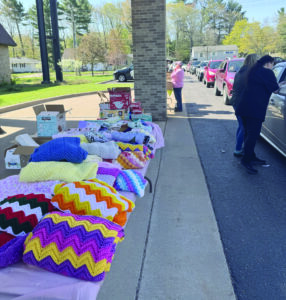Federal funding cuts to PBS and NPR will affect local station
MARQUETTE — In a May 1 executive order, the White House stated their intention to cut federal funds to PBS and NPR, citing their supposed biased reporting as reasoning.
“Neither entity presents a fair, accurate, or unbiased portrayal of current events to taxpaying citizens,” said the White House’s statement.
America’s Public Television Stations was quick to release a response.
“By eliminating funding for PBS and NPR, this executive order would destroy the local-national partnership that is essential to local public television stations’ ability to provide their communities with the mix of local, regional, independent and national programming that their communities rely on,” said Kate Riley, President and CEO of the APTS.
Cutting federal funds to PBS and NPR will have rippling effects that reach all the way to Marquette’s own public broadcasting station, WNMU-TV, which provides services to the entire Upper Peninsula.
Currently, WNMU-TV’s essential services include public safety, education, and community connections; any/all of which could face cuts in the case of a loss of funding. One of their most critical roles is serving as an emergency alert system.
“WNMU-TV acts as the hub for all the emergency alerts that come in from either presidential, national, state, local and weather alerts and amber alerts,” said Patrick Lakenen, Director of Broadcast and Audio Visual for WNMU-TV.
WNMU is the only relay station of this kind in the U.P., serving over 250,000 people. When the alerts come in, the station sends them out to other news agencies and are part of the team that pushes critical alerts to people’s phones.
WNMU also provides programming and resources for K-12 students in seven school districts, accounting for over 36,000 students total.
“More than half of pre-K children don’t attend formal preschool,” said Lakenen. “We act as a source to provide age-appropriate STEM and literacy programming resources to prepare kids for school. An example of that is we are part of the Michigan Learning Channel with the six Michigan public TV stations.
“The Michigan Learning Channel’s mission is to enrich school learning with instructional content aligned with Michigan’s teaching standards through programming and resources available to schools, families and caregivers. So we work closely with all the other stations to do that for the entire state of Michigan, which is over 400,000 students.”
The station also works directly with U.P. residents, providing them with services and learning opportunities.
“WNMU-TV works with educators to get standards-aligned materials together for kids,” said Lakenen. “Not to replace school, but to enrich it so there are more resources available.
“We travel around the entire U.P., all 16,000 square miles. We have a coordinator that goes to libraries and different events to promote us as a resource for teachers and for families.
“We also work with Northern Michigan University to provide hands-on learning experience for the students, giving them hands-on experience. In a typical school year we’ll have 60 to 80 students come through.”
Currently, federal funding constitutes a full third of WNMU’s budget, so any cuts to that funding would have significant repercussions for the station and the programs they are able to provide.
“If there is a potential cut, it’s going to hurt the station,” said Lakenen.
“The stations that will be most affected are the ones that are in rural, remote communities like the U.P. Part of that is because there isn’t another way to recapture additional fundraising when you are in an area that has a small population. There just isn’t a way to get those dollars back.”
The disproportional impact of funding cuts on rural stations is especially concerning as rural areas tend to be the places where people rely on public stations the most, in absence of other media sources.
“Over 160 locally operated and controlled public television stations serve communities small and large throughout this country, providing a lifeline in hundreds of communities where there is no other source of local media,” said Riley.
“We’re a local station in our local community and that’s where our focus is,” said Lakenen. “The programming we get through PBS is programming that we pay for that our viewers like. Same thing for NPR; our listeners like NPR so we pay for the programming. The federal funding cuts hurt small local stations.
“Federal funding is essential and irreplaceable for WNMU. It allows us to provide critical local services including local emergency alerting, educational resources and local community driven programming.”
However, these cuts have not yet gone into effect, and are not yet set in stone.
“The best way right now to help is to reach out to your members of Congress and let them know that you support WNMU, you support public media,” said Lakenen. “That will go a long way because hard decisions haven’t been made yet.
“The more Congress hears from the constituents in their districts, in their states, the more that they’re going to realize what people would like to see happen. There is a great grassroots organization that we’ve been sending everybody to called ProtectMyPublicMedia.org. All the information is on there and they make it really easy to be part of the mission to retain federal funding.”
APTS’s full statement can be found at https://apts.org/news/press-releases
Annie Lippert can be reached at 906-228-2500, ext. 542. Her email address is alippert@miningjournal.net.


